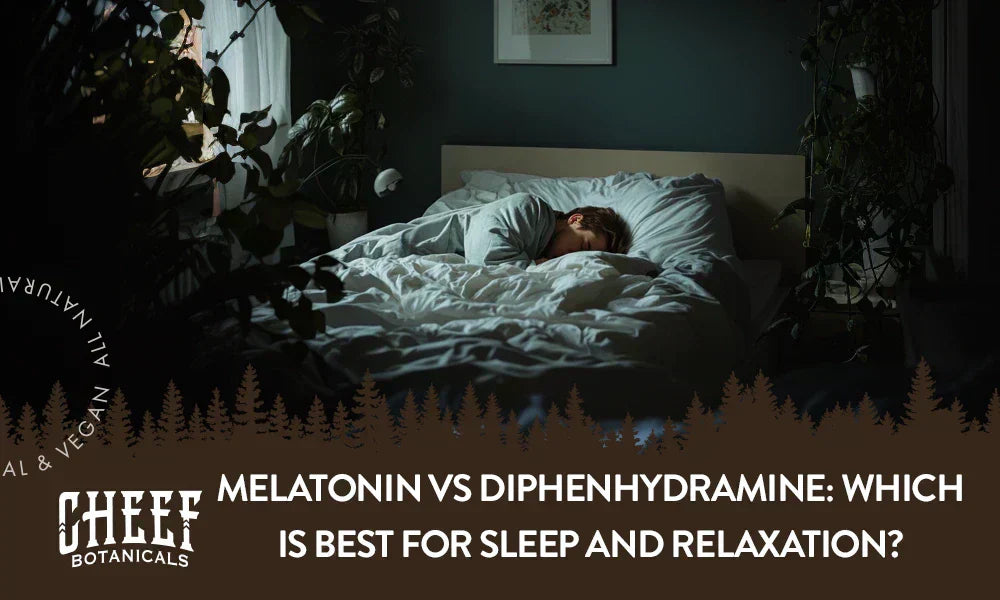Are you trying to decide between melatonin and diphenhydramine for quality sleep? We hear you. These two options are on nightstands everywhere, but they don't work the same way and are not for everyone.
Melatonin is a lab-made version of what your body already makes to manage your natural sleep-wake cycle. Meanwhile, diphenhydramine is the active ingredient in many allergy meds and some over-the-counter sleep aids. It's been around for decades but isn't exactly designed for nightly use.
It helps to know what each option actually does, whether you're dealing with restless nights or just want to upgrade your bedtime routine. Let's break it all down plain and simple. No fluff, no hype, just facts that help you make a smart call.
What Is Melatonin?

Melatonin is a hormone your body makes naturally, mostly in the evening when the lights go down. It's produced by the pineal gland and tells your brain it's time to slow down. Think of it like your body's built-in clock, setting the mood for rest as evening approaches.
Most melatonin supplements on the market are lab-made. They're often used to help with sleep problems like jet lag or occasional trouble falling asleep. These products aim to support your sleep-wake cycle without knocking you out cold.
Melatonin's appeal is that it's not habit-forming and doesn't come with the heavy fog that some sleep medications bring. For many people, it's a low-key option that encourages a more natural bedtime rhythm, especially when used short-term and at the right time.
What Is Diphenhydramine?
Diphenhydramine is an antihistamine that pulls double duty. It's best known for helping relieve allergy symptoms like a runny nose or watery eyes, but it can also make you drowsy real quick. That's why you'll find it in a lot of OTC sleep medicines, including big-name brands like Benadryl.
This stuff slows down your brain activity, which can make it easier to fall asleep. But it wasn't designed for long-term sleep support, and the grogginess can bleed into the next day. That's the trade-off.
People use diphenhydramine when they need to crash fast, like after a long night or when sleep just won't come. It's not for daily use. But in the short term, it's a common go-to when your bed's calling and your brain's still buzzing.
How Do Melatonin and Diphenhydramine Work for Sleep?
Both melatonin and diphenhydramine can help you sleep, but they take different paths to get there. Melatonin taps into your body's natural rhythm. It signals that evening has arrived, nudging your brain to wind down. It doesn't force sleep but encourages it.
Diphenhydramine, on the flip side, is more about sedation. It dulls your brain's activity, slows your reaction time, and basically knocks you out. That drowsiness is a side effect of how it blocks certain chemicals in your brain.
So, while melatonin works with your natural sleep cycle, diphenhydramine overrides it. One's more of a gentle guide. The other's more of a shut-it-all-down switch.
How Melatonin Helps Regulate Sleep
Melatonin helps your body follow its natural sleep-wake rhythm. When the sun goes down and the lights dim, your brain starts pumping out this hormone to let your system know it's bedtime. That's the signal to chill, slow your thoughts, and start winding down.
Melatonin products work best when your internal clock is off, like after a long flight or a few late nights in a row. People turn to this option when they're dealing with things like jet lag, graveyard shifts, or staying up too late too often. Taking melatonin can support your body's natural rhythm and help reset your sleep schedule without knocking you flat.
How Diphenhydramine Affects Sleep
Diphenhydramine hits your system fast and makes you drowsy by blocking histamine, a natural chemical that keeps you alert. Once that's shut down, your brain slows and sleep usually follows. Not always naturally, but definitely quickly.
This is why it's added to certain OTC sleep aids. It's not made for sleep, but the sedative effects are strong enough that people use it when they need rest ASAP.
But here's the catch: That heavy drowsiness can linger into the next day. Some folks wake up groggy, dry-mouthed, or feeling foggy. So, while diphenhydramine can help you sleep, it doesn't always mean you'll wake up feeling refreshed.
Melatonin vs Diphenhydramine: Which Is More Effective for Sleep?
Effectiveness really depends on what kind of sleep help you're looking for. Melatonin is ideal for improved sleep habits and long-term balance. Diphenhydramine is more of a quick fix. Knowing which one fits your lifestyle makes all the difference.
If your goal is to support your natural sleep rhythm, melatonin usually wins. It works with your body, not against it. And it's less likely to leave you dragging the next day.
Diphenhydramine works fast and hard. It's a solid option when you need something strong and short-term and don't mind possibly waking up groggy. But it's not meant for daily use and can lose its punch over time.
Can You Take Melatonin and Diphenhydramine Together?
Yes, melatonin and diphenhydramine (commonly known as Benadryl) can generally be taken together, as there’s no direct harmful interaction between the two. Melatonin helps regulate your natural sleep cycle, while diphenhydramine is an antihistamine that causes drowsiness and is often used as a short-term sleep aid. Taking both may increase sedative effects, potentially leading to next-day grogginess, dizziness, or difficulty concentrating.
While this combination is usually safe for occasional use in healthy adults, it’s not recommended for regular use—especially for children, older adults, or those with liver, kidney, or other medical conditions. Over-sedation and disrupted sleep patterns can occur. Always consult with a healthcare provider before combining sleep aids, particularly if you're on other medications or managing health issues.
Benefits of Melatonin for Regulating Natural Sleep Cycles
If you're struggling with staying asleep or falling asleep at the right time, melatonin can help steer things in the right direction. Here's how it supports better rest:
- Supports the Natural Sleep-Wake Cycle. Melatonin helps regulate when your body feels sleepy and when it should wake up.
- Helpful for Jet Lag. Melatonin can help ease the transition into a new time zone, making it easier to rest when your schedule shifts.
- Non-Habit Forming Option. Unlike some prescription sleep aids, melatonin doesn't create a need for more over time.
- Great for Occasional Use. Works best when used short-term or on evenings when your schedule's off, not as a daily routine.
- Minimal Next-Day Grogginess. Many people feel refreshed after sleep instead of foggy, especially with proper timing and dosage.
Benefits of Diphenhydramine for Short-Term Sleep Relief
When you're desperate for rest, diphenhydramine gets the job done. Here's where it shines:
- Fast-Acting Drowsiness. It kicks in quickly, making it easier to fall asleep within the hour.
- Widely Available. Found in common meds like Benadryl and many OTC sleep products, so it's easy to access.
- Dual Purpose. Helps with both sleep issues and allergy symptoms like a runny nose or watery eyes.
- No Prescription Needed. You can grab it off the shelf, no doctor visit required.
- Helpful for Temporary Sleep Problems. Works well if you're dealing with occasional restlessness or short-term trouble sleeping.
Featured Products: Cheef Botanicals Sleep Gummies [Contains Melatonin]

When you need more than melatonin alone, Cheef Botanicals brings the backup. Our melatonin-infused CBD and THC sleep gummies blend powerful natural support into one tasty, chill-inducing bite. They're built for people who want to fall asleep, stay asleep, and wake up feeling fresh.
- Melatonin + CBD Sleep Gummies. All-natural and non-habit forming, these gummies blend hemp-derived CBD and CBN with melatonin for full-body calm and rest. Take one before bed to support your sleep quality without the next-day fog.
- Melatonin + THC Sleep Gummies. For deeper relaxation, our Delta-9 THC, CBN, and melatonin-powered gummies turn down the mental noise and help you stay asleep soundly. They deliver a soothing, full-body calm while letting you wake up refreshed and energized the morning after.
Are There Any Other Natural Alternatives for Better Sleep?
Yep, melatonin and diphenhydramine aren't your only options. Plenty of natural sleep boosters can help you unwind. Here are some worth trying:
- CBD. Known for its calming vibes, CBD helps relax the mind and body. Many people use it to quiet racing thoughts and prep for bed.
- THC. In low amounts, THC can help mellow you out and help you go to sleep faster.
- Chamomile. A classic bedtime tea herb that may ease tension and support natural sleep patterns.
- Lavender. Found in oils, sprays, or diffusers, lavender's calming scent helps signal to your brain that it's time to chill.
Potential Side Effects and Considerations of Melatonin and Diphenhydramine
Both melatonin and diphenhydramine can help you catch some Z's, but they're not totally risk-free. Here are some side effects to watch out for:
- Daytime Drowsiness. Diphenhydramine, in particular, can leave you groggy the next morning.
- Dry Mouth. A common side effect with diphenhydramine. It's not dangerous, but it's definitely annoying.
- Upset Stomach. Some people report queasiness or stomach troubles with melatonin, especially in higher doses.
- Headaches or Dizziness. Both sleep aids can occasionally cause headaches or make you feel a little off balance.
- Interaction With Other Meds. Always double-check if you're taking other medications. Both can interfere with or stack effects you didn't plan on.
If you're unsure, check in with a doctor before starting anything new. Better safe than sorry!
Choosing the Best Sleep Aid for Your Needs
If you're looking for something that works with your body instead of against it, melatonin is usually the better choice. It helps bring your natural sleep-wake rhythm back into balance, especially when life throws it off.
For those nights when you simply want to knock out fast, diphenhydramine might do the trick. But it's not built for long-term use, and that next-morning haze isn't for everyone. It's more of a backup plan, not a go-to.
Want to level up your sleep game? Adding CBD or THC to melatonin can create a powerful combo. Products like Cheef Botanicals' Sleep Gummies mix calming plant power with melatonin to help you fall asleep fast and wake up feeling clear, not cloudy. Now that's a proper reset!
Final Thoughts on Melatonin vs Diphenhydramine for Sleep and Relaxation
The better pick between melatonin and diphenhydramine depends on how you want to sleep. If you want something natural, gentle, and effective, melatonin takes the lead. For a quick fix, diphenhydramine's here for you.
And if you're looking for something even more supportive, Cheef Botanicals' CBD and THC Sleep Gummies step it up. They blend plant-based goodness with melatonin to help you fall asleep faster, stay in dreamland longer, and wake up feeling right.
Sleep doesn't have to be a struggle. You've got real options. Just pick the one that fits your flow and helps you rest easy.






Leave a comment
This site is protected by hCaptcha and the hCaptcha Privacy Policy and Terms of Service apply.